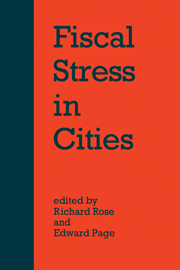Book contents
- Frontmatter
- Contents
- Acknowledgments
- 1 Can Government Control Itself?
- 2 Pressures in Whitehall
- 3 Pressures from Whitehall
- 4 The Decline of Urban Economies
- 5 Local Government as an Employer
- 6 Do Fewer Pupils Mean Falling Expenditure?
- 7 Local Autonomy and Intergovernmental Finance in Britain and the United States
- 8 Chronic Instability in Fiscal Systems
3 - Pressures from Whitehall
Published online by Cambridge University Press: 07 October 2011
- Frontmatter
- Contents
- Acknowledgments
- 1 Can Government Control Itself?
- 2 Pressures in Whitehall
- 3 Pressures from Whitehall
- 4 The Decline of Urban Economies
- 5 Local Government as an Employer
- 6 Do Fewer Pupils Mean Falling Expenditure?
- 7 Local Autonomy and Intergovernmental Finance in Britain and the United States
- 8 Chronic Instability in Fiscal Systems
Summary
Since 1974 local authorities in England and Wales have been under increasing fiscal pressure for two reasons. Firstly, reliance upon a property tax, rates, for raising tax revenue makes local authorities especially vulnerable to the effects of inflation. The property tax is not buoyant, since the assessed value of property is not raised annually in keeping with inflation. Thus, rates produce the same revenue yield each year unless the level of taxation, i.e. the rate per pound of assessed value, is altered. During a period of high inflation, such as Britain has experienced since 1974, local authorities inevitably face acute fiscal pressure, because inflation pushes up costs without increasing revenue (Sharpe 1981).
The second cause of fiscal pressure, of greater concern here, arises from the interconnection of central and local government fiscal measures. At Westminster successive governments have pursued policies of limiting public expenditure in order to combat inflation. Part of that macro-economic strategy has involved setting local government annual expenditure targets intended to reduce the growth of local spending, or even lower the volume of local services. The targets, although advisory and without the force of law, have been reinforced by reductions in grant support by central governments. A consequence of central government's policy has been to increase the financial difficulties already facing local authorities because of inflation by reducing the effective value of central government grants, which provide local authorities with almost half of their income.
- Type
- Chapter
- Information
- Fiscal Stress in Cities , pp. 44 - 76Publisher: Cambridge University PressPrint publication year: 1983
- 2
- Cited by

